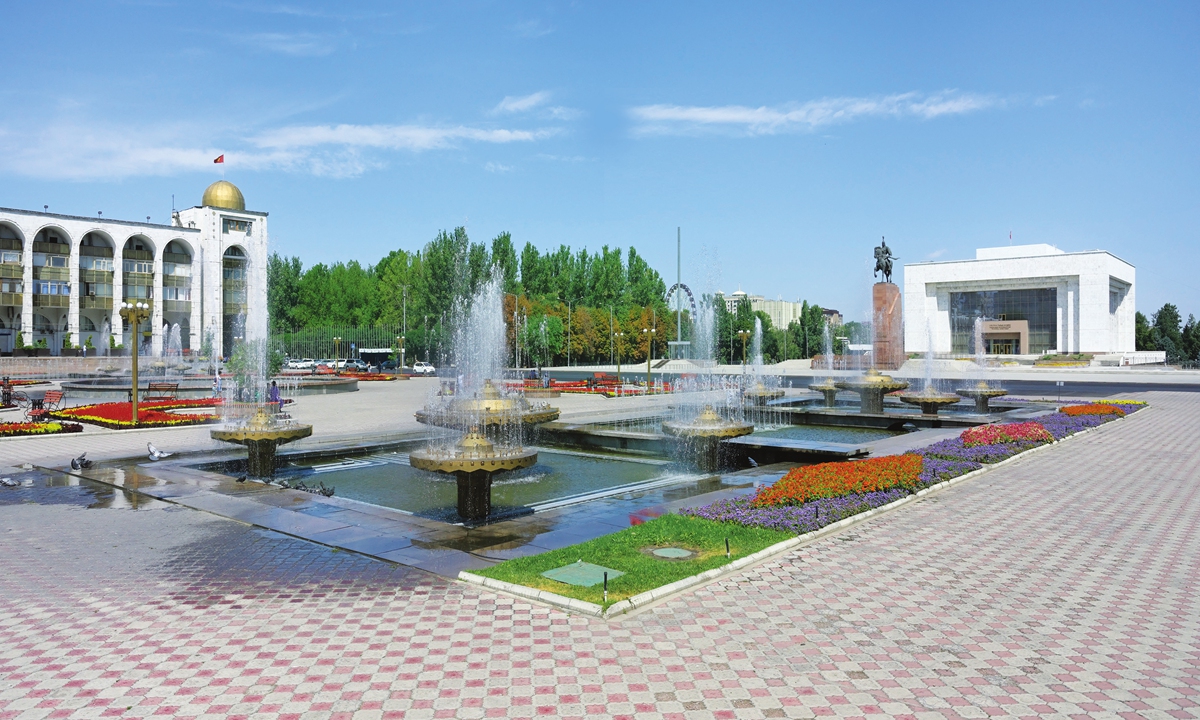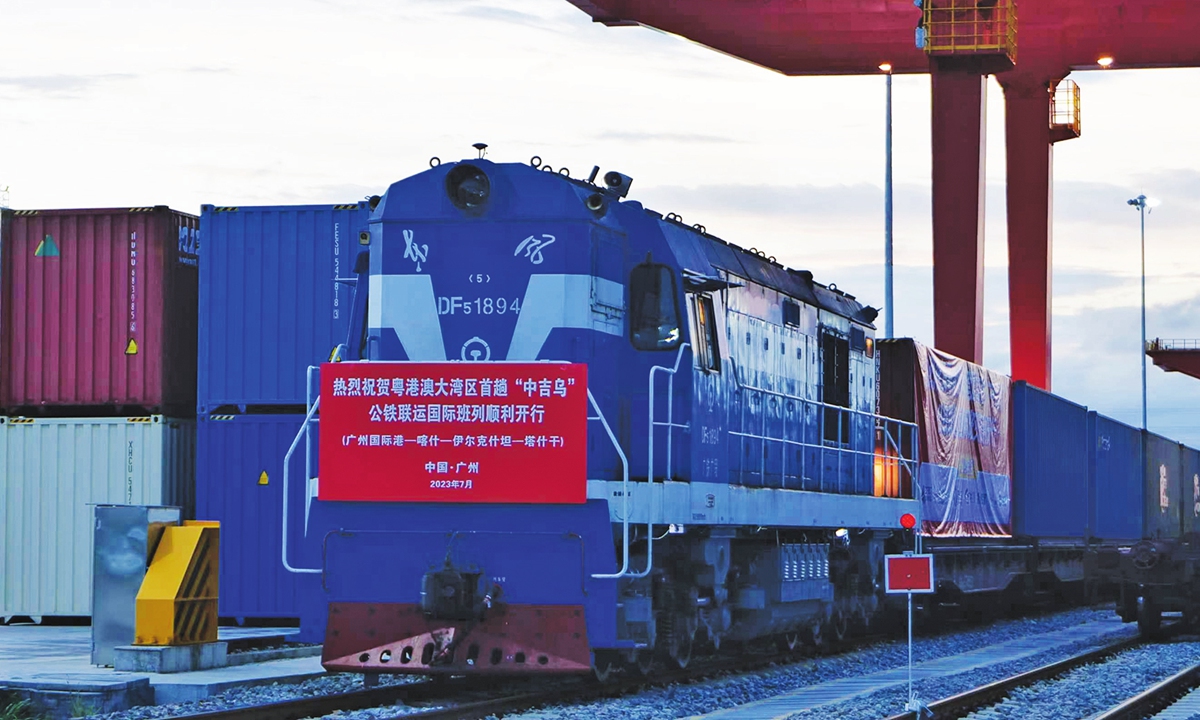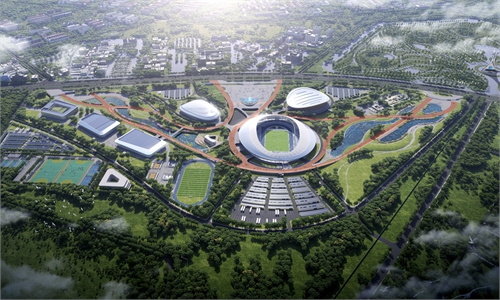
Ala-Too Square, State History Museum and Manas Statue in Bishkek, Kyrgyzstan. Photo: AFP
Editor's Note:
The past year 2023 was a busy one for China in terms of its interactions with the rest of the world. Its foreign relations always have a profound impact on its economy, strategy and people's livelihoods. Global Times, in collaboration with China's universities and think tanks, is now releasing a series of country reports. The aim of these reports is to enhance understanding of relevant countries, provide a framework for dealing with China's relations with these countries, and grasp the trajectory of these relations.
In the third report of the series, we focus on Kyrgyzstan, a country located in Central Asia.
After China proposed the Belt and Road Initiative (BRI) in 2013, the Central Asian country of Kyrgyzstan has actively responded to the initiative and deepened collaboration with China at the national strategic level. The two countries have entered a new phase of economic and trade cooperation, resulting in significant achievements in areas such as energy, transportation and agriculture. These accomplishments have elevated the bilateral relationship to new heights of neighborly friendship. China has consistently maintained its position as Kyrgyzstan's largest trading partner and primary source of investment for many years.
Fruitful achievements
President Xi Jinping visited Kyrgyzstan and attended the Shanghai Cooperation Organization (SCO) Summit in Bishkek in September 2013. During the visit, the two countries elevated their bilateral relationship to a strategic partnership. In June 2018, then Kyrgyzstan's president Sooronbay Jeenbekov visited China, and the two countries upgraded their bilateral relationship to a comprehensive strategic partnership.
In January 2021, China congratulated Sadyr Japarov on winning the Kyrgyzstan presidential election, expressing willingness to continue to deepen mutually beneficial cooperation with Kyrgyzstan. In February, President Xi had a telephone conversation with President Japarov, during which Xi pointed out that the China-Kyrgyzstan relationship has stood the test of international changes and maintained a momentum of sound and steady development. In June, President Japarov congratulated President Xi on the 100th anniversary of the founding of the Communist Party of China.
During the Beijing Winter Olympics in February 2022, President Xi met with President Japarov. In May 2023, President Xi held talks with President Japarov, who was visiting China to attend the China-Central Asia Summit and for a state visit. The two presidents announced the elevation of the bilateral relationship to a comprehensive strategic partnership for a new era.
Under the framework of the BRI, the two sides have completed two strategically significant cooperation projects in Kyrgyzstan. Firstly, China has played a crucial role in helping Kyrgyzstan achieve energy independence. On August 28, 2015, the Datka-Kemin 500kV power transmission line, which was built by the Chinese company TBEA, was officially completed. During the celebration of Kyrgyzstan's 24th anniversary of independence, then president Almazbek Atambayev stated that because of Datka-Kemin, Kyrgyzstan achieved "energy independence." Secondly, significant progress has been made in agricultural cooperation between China and Kyrgyzstan. The two countries have established a "green channel" to expedite the clearance process for agricultural products, facilitating the entry of Kyrgyzstan's agricultural goods into the Chinese market.
Under the framework of the BRI, Chinese enterprises have implemented a series of major projects in Kyrgyzstan. The new North-South highway has a total length of 433 kilometers and is divided into three phases. Phase one and phase two of the project were completed in 2021.
According to data from the National Statistical Committee of Kyrgyzstan, China has become the largest source of investment in Kyrgyzstan since 2016. In addition, Kyrgyzstan attaches great importance to the Asian Infrastructure Investment Bank (AIIB) and has participated as a founding member. Kyrgyzstan believes that the establishment of the AIIB is conducive to the implementation of many domestic projects.
The most important project of cultural cooperation between China and Kyrgyzstan is the successful joint application for the UNESCO World Heritage Site "the Silk Roads: the Routes Network of Chang'an-Tianshan Corridor." The Chinese language fever has become a highlight of cultural exchanges between China and Kyrgyzstan. There are four Confucius Institutes and 21 Confucius Classrooms in Kyrgyzstan, playing a role as a bond for educational and cultural cooperation.
Both China and Kyrgyzstan are members of major multilateral cooperation mechanisms in the region such as the SCO and the China-Central Asia head-of-state meeting mechanism. The two countries have maintained contacts and dialogues on various multilateral occasions, and are important forces in safeguarding regional security and stability. Under the cooperation framework of the SCO, China and Kyrgyzstan are jointly committed to promoting the sound and stable development of the SCO as well as uniting other regional forces to promote the construction of a new type of international relations and a global community of shared future.

The first China-Kyrgyzstan-Uzbekistan freight train carrying signature products of the Guangdong-Hong Kong-Macao Greater Bay Area sets off from the International Port of Guangzhou on July 4, 2023. Photo: cnsphoto
Deepening cooperation under BRI
After examining Kyrgyzstan's official documents, as well as the speeches and articles of senior officials and scholars, it's evident that Kyrgyzstan holds a generally positive view of the BRI. The BRI is perceived as a significant and comprehensive project for international economic cooperation, aiming to reestablish economic and trade connections among countries along the ancient Silk Road through modern means. The construction of the Belt and Road is expected to introduce new positive development elements into Kyrgyzstan and other countries along the route, while Chinese investment is seen as a source of new opportunities for Kyrgyzstan.
During Chinese President Xi's visit to Kyrgyzstan in September 2013 where he also attended a SCO summit, then president Almazbek Atambayev of Kyrgyzstan said that the Kyrgyz side supports President Xi's proposal of building the "Silk Road Economic Belt." In June 2018, President Xi met with then Kyrgyz president Sooronbay Jeenbekov, the Kyrgyz side expressed that Kyrgyzstan backs the China-proposed BRI. In 2021, Kyrgyz President Sadyr Japarov noted in an interview that "we see this initiative as a serious source and incentive for the implementation of joint projects, as well as the development of infrastructure."
In the early stages of Belt and Road cooperation, Kyrgyzstan was actively responding to China's demand for projects. However, it has since adjusted its approach to maximize its own interests. Currently, it tends to selectively engage in cooperation projects related to production capacity, and aims to become a key node connecting the Belt and Road with the Eurasian Economic Union.
We should insist on communication and dialogue with Kyrgyzstan regarding issues involving our national core interests, and conduct bilateral exchanges on an equal, pragmatic and fair basis. In terms of major issues, it's crucial to maintain communication and collaboration, especially when dealing with regional conflicts and major international affairs. We must adhere to the principles of mutual non-aggression and noninterference in each other's internal affairs, in order to sustain the high level of bilateral cooperation in the political field. Furthermore, we fully support Kyrgyzstan in exploring an independent and autonomous democratic path and development model that aligns with its national conditions, as well as its historical and traditional characteristics.
We should rely on the SCO platform and draw on the accumulated experience of bilateral security cooperation, and increase our investment in the security cooperation with Kyrgyzstan.
First, the frequency and scale of joint counter-terrorism military exercises and joint border patrols should be elevated to further deter terrorists, such as those from the Eastern Turkestan Islamic Movement, from carrying out illegal activities.
Second, the assistance to Kyrgyzstan in the area of security and defense should be boosted to help enhance its security capacity.
Third, China-Kyrgyzstan border security cooperation should be strengthened to prevent the mutual infiltration of terrorists between Kyrgyzstan and China's Xinjiang region. Furthermore, we should assist Kyrgyzstan in beefing up its border defenses with neighboring countries, such as Kazakhstan, Uzbekistan and Tajikistan, to prevent terrorists from moving among Central Asian countries.
China and Kyrgyzstan should continue to promote the construction of key projects, such as infrastructure. Infrastructure construction plays a vital role in facilitating the efficient flow of production factors. The infrastructure projects between China and Kyrgyzstan, including railways, highways, and energy infrastructure, serve as a solid foundation and guarantee for China and Kyrgyzstan to promote high-quality construction of the BRI.
Efforts should be made to promote the implementation of "small and beautiful" BRI projects.
Additionally, the establishment of the China-Kyrgyzstan investment fund can provide incentives for economic and trade cooperation, help expand the scale of economic cooperation, and ensure the successful implementation of cooperation projects.
The two countries should promote bilateral trade to be settled in RMB to avoid financial risks. The conflict between Russia and Ukraine and the economic sanctions imposed by the US and Western countries may continue to affect exchange rates. In order to ensure the financial security and smooth advancement of bilateral trade between China and Kyrgyzstan, it is necessary to comprehensively study the benefits and risks of RMB settlement and safeguard bilateral interests.
Agricultural cooperation should be strengthened. Kyrgyzstan is a country that relies on agriculture, and it is to China's advantages to developing agricultural cooperation and cooperation on resources can weaken the "China threat" theory. The two countries can also develop third-party cooperation and promote the construction of the China-Central Asia-West Asia Economic Corridor, endeavor to undertake projects with other countries in the region so as to diversify risks, develop the China-Kyrgyzstan-Uzbekistan transportation corridor, and explore cooperation with countries outside the region to develop the Kazakhstan-Kyrgyzstan-Uzbekistan transportation and energy corridor.
Outlook for 2024
In 2024, the two sides will step up the implementation of the outcomes of the China-Central Asia Summit and a number of bilateral cooperation documents signed in 2023 on regional cooperation, digital economy, sub-national cooperation and infrastructure. They can further align development strategies, deepen the integration of economic interests, take high-quality joint construction of the BRI as the main theme, implement the plan for medium- and long-term economic and trade cooperation between China and Kyrgyzstan, give full play to the complementary advantages of industries, promote trade expansion, optimize structure and maintain the stability of industrial and supply chains. Cooperation in emerging industries such as advanced manufacturing, digital economy, new energy vehicles, smart agriculture, and clean energy can be expanded to cultivate new momentum for development. Counter-terrorism cooperation can be strengthened to jointly maintain a safe and stable development environment.
Furthermore, close collaboration within multilateral mechanisms such as the United Nations and the SCO will be pursued to safeguard the common interests of developing countries and uphold international fairness and justice.
Xu Changzhi and Su Chang are research fellows at the Chinese Academy of Social Sciences. Chen Dongjie is deputy director of the Central Asia Research Institute at Shaanxi Normal University. opinion@globaltimes.com.cn

